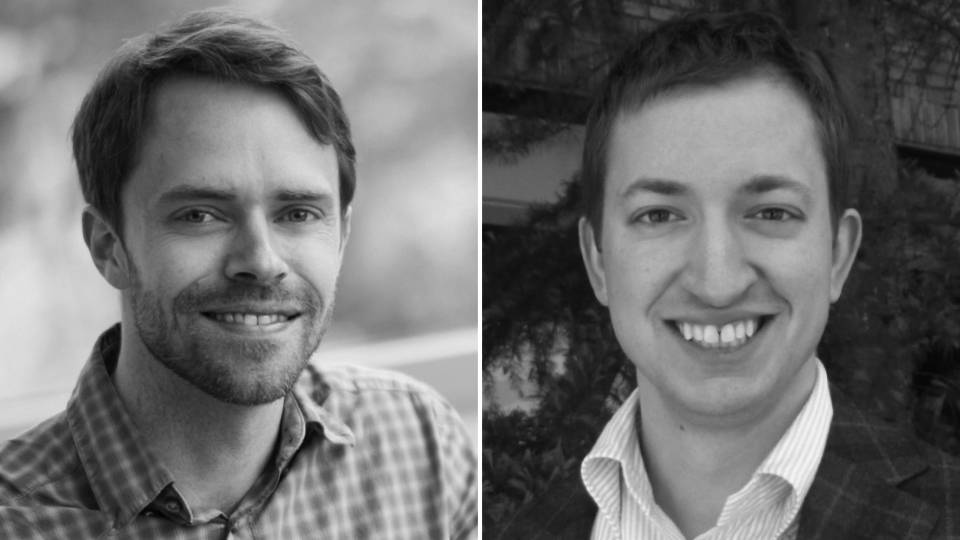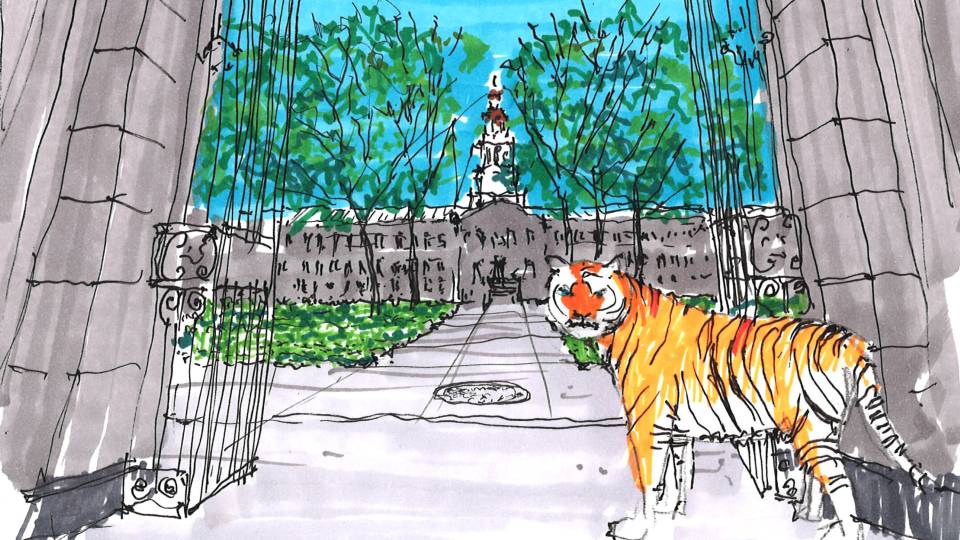The power of persistence was celebrated as a hallmark of the Class of 2022 on Tuesday, May 24, at Princeton’s 275th Commencement. The University awarded 1,234 undergraduate degrees and 655 graduate degrees during the ceremony on a cool spring morning in Princeton Stadium.
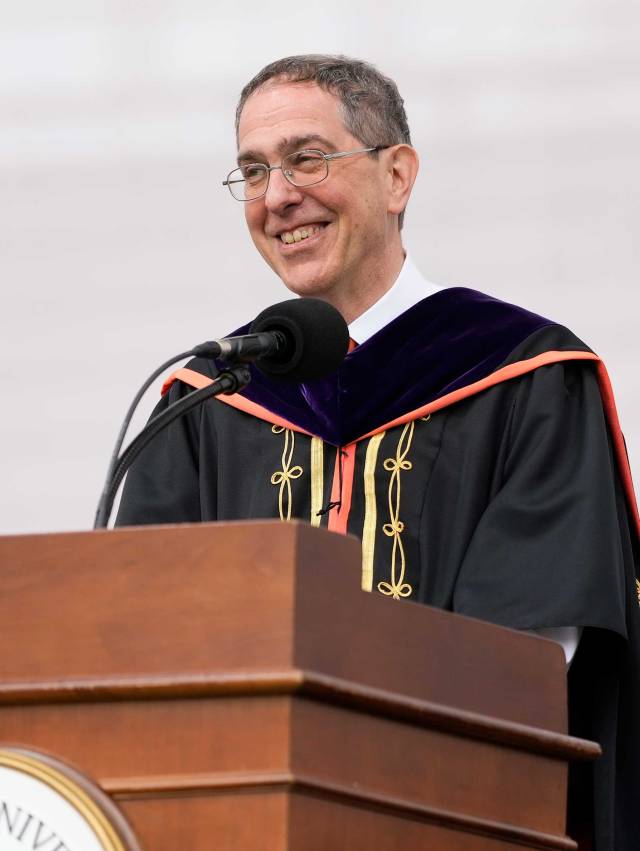
President Christopher L. Eisgruber delivers his Commencement address, “The Value of Persistence.”
“It is an honor to speak to the Great undergraduate and graduate Classes of 2022. Earning a Princeton degree is an exceptional achievement in any year, but you have overcome challenges that none of us could have imagined when you began your studies here,” President Christopher L. Eisgruber said in his speech, “The Value of Persistence,” referring to the particular challenges experienced by students during the COVID-19 pandemic.
Princeton’s undergraduate Class of 2022 represents 49 U.S. states and territories and 67 countries; approximately 18% of the class are first-generation college students. Of the 2022 graduate students, 447 earned Ph.D. degrees and 208 earned master’s degrees.
“You earned your degrees today in many ways and for many reasons, but not least because you persisted brilliantly throughout your time on this campus and away from it,” Eisgruber said. “You persisted not only through a world-altering pandemic, but through problem sets, writing assignments, laboratories, midterms, finals, senior theses, dissertations, and the personal crises and doubts that are an inevitable part of college life and, indeed, of life more generally.”
“Persisting through college matters, which is why we celebrate Commencement day with admiration and exuberant joy,” he added.
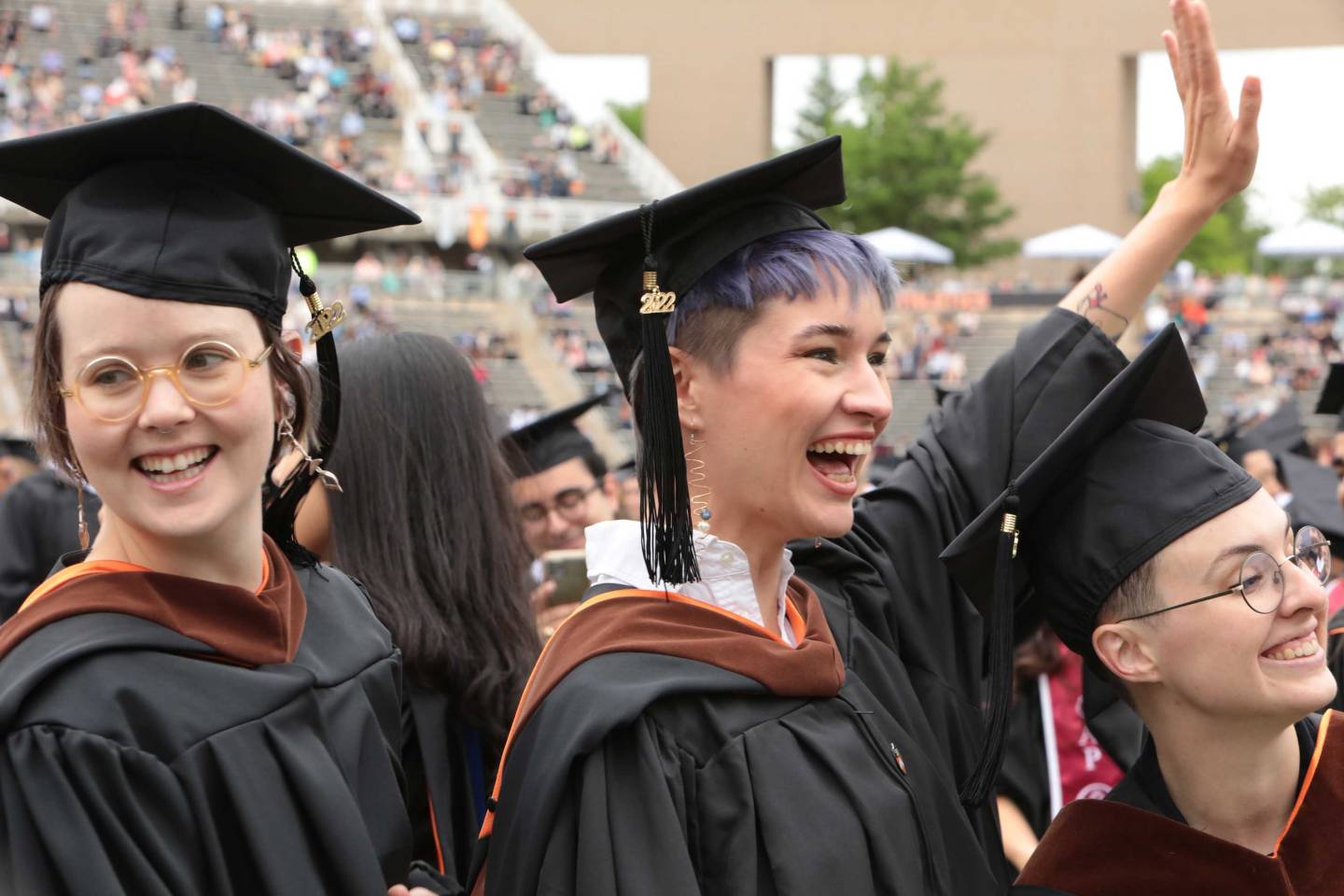
A graduate waves to family and friends in the crowd at Princeton Stadium.
While less glamorous than traits like creativity or courage, persistence may be the best predictor of success, Eisgruber said.
The graduates seated in chairs on Powers Field had persisted at Princeton with the support of faculty, staff, friends, family and countless campus resources. However, Eisgruber noted, there are other students around the country with much different college experiences.
“At college Commencements around the country, there are missing chairs and missing students this year, and there will likely be more missing chairs in the years to come,” he said. “Some students left school during the pandemic and have not returned. Some high school students who might have gone to college have made other choices instead. Though the data is incomplete, both problems appear to have a disproportionate effect on students from less advantaged backgrounds and those who attend community colleges and other public, two-year institutions.”
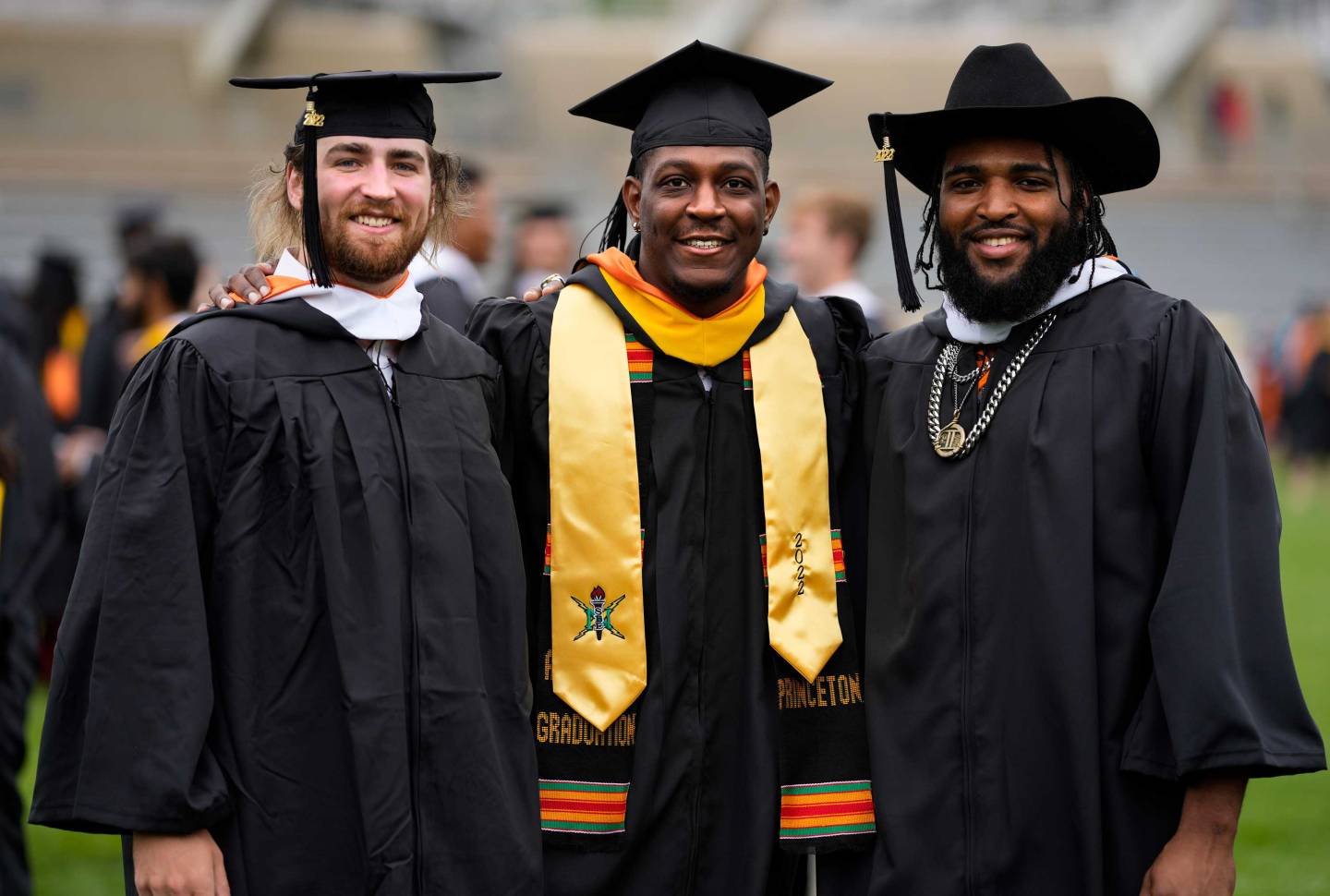
Members of the Class of 2022 wear caps, gowns and even cowboy hats to Commencement.
Given the transformative power of a college degree, Eisgruber said it is essential to help students at two- and four-year colleges and universities persist to graduation. He advocated for state and federal policies that help students return to and finish college, and he charged Princeton graduates to use their privilege to support other students.
“None of us succeed on our own, in normal times or in difficult ones,” Eisgruber said. “And, in that spirit, I hope, too, that as all of you pursue quests and adventures beyond this campus, you will help others to persist across the finish line as you have done so remarkably yourselves. I know that, whatever you do, you will make Princeton proud, and that you will put your talents, creativity and character to work in ways that we can scarcely imagine today.”
Dean of the College Jill Dolan voiced similar sentiments during her presentation of undergraduate degrees.
“Your class absorbed surprises and interruptions as a strong community. Your in-person and remote learning and study demanded enormous grit, commitment and creativity,” Dolan said. “My colleagues and I are very proud of who you are and what you have accomplished. … Each and every one of you has left your imprint on this University.”
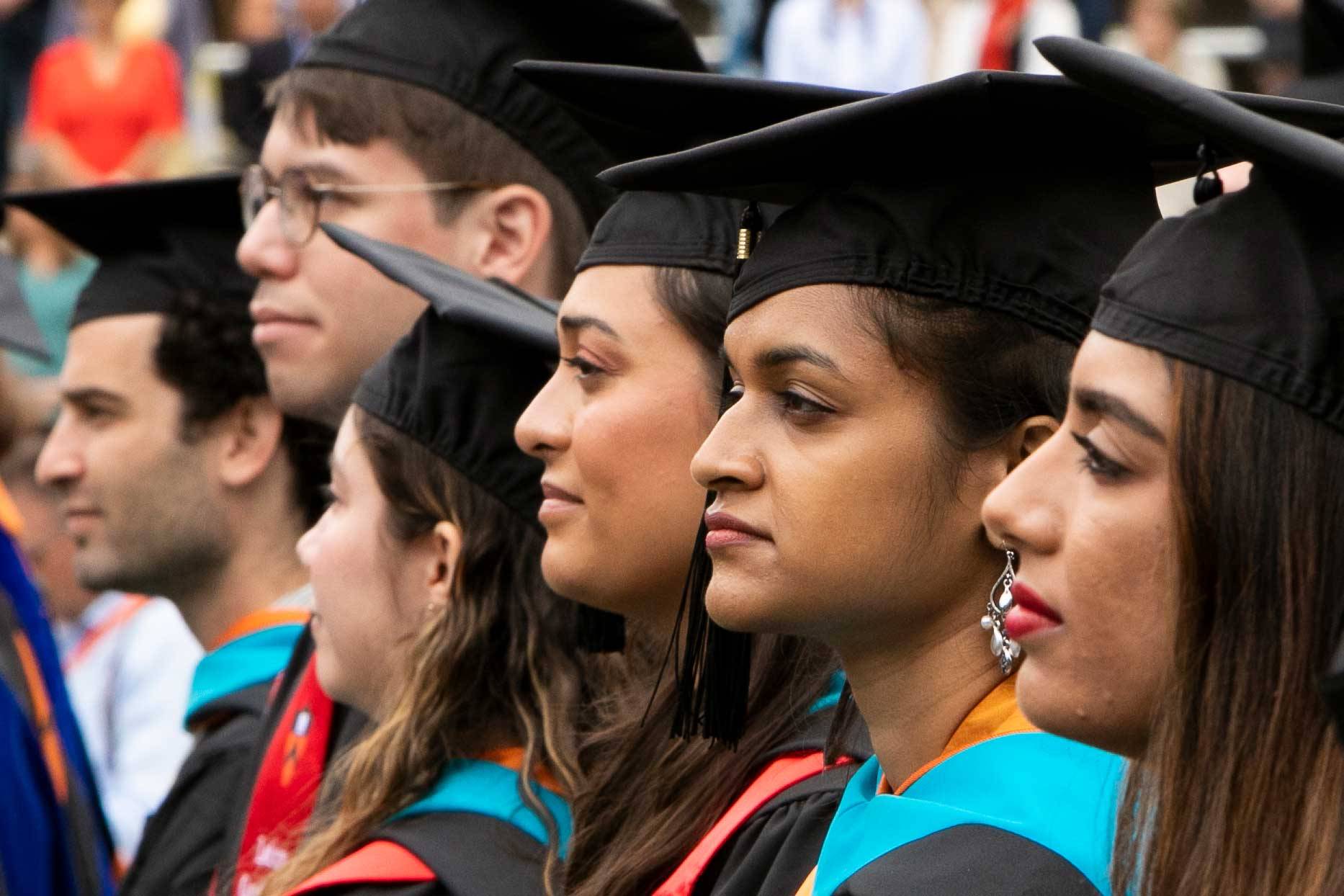
Graduate degree recipients attend Princeton’s Commencement. Master’s and Ph.D. recipients also participated in a Hooding ceremony for advanced degree candidates on Monday, May 24.
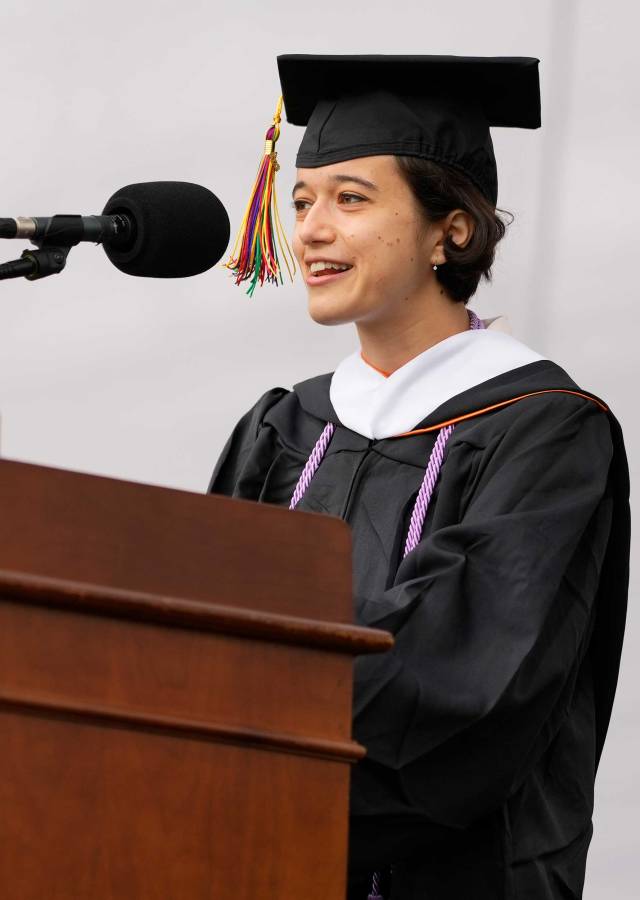
Valedictorian Natalia Orlovsky, a molecular biology concentrator from Chadds Ford, Pennsylvania, reflects on her final task as an undergraduate: saying farewell.
In her valedictory address, Natalia Orlovsky, a molecular biology concentrator from Chadds Ford, Pennsylvania, reflected on her final task as an undergraduate: saying farewell.
“If faring well is an active process, then the act of valediction is less a closing of the past than a forward-looking prayer,” she told her peers. “Tomorrow, we will disperse along highways and jet streams. In our new homes, across countries and continents, we will continue drifting forward, together, through time.”
Though life beyond campus may be challenging, Orlovsky said, Princetonians are equipped to improve the world waiting for them outside of FitzRandolph Gate.
“The earth is warming, and the oceans rising. … At the same time, activists, journalists, and artists are bravely working to dismantle oppressive systems, while scientists and engineers combat public health crises and environmental challenges,” she said. “In other words, there is space for hope, for action, and for change.”
“I wish you safe travels and gentle landings,” Orlovsky told her classmates. “More than anything, I wish you hope, even — and, perhaps, especially — in the face of uncertainty. I hope that, wherever you end up, you get to build communities founded on empathy and radical compassion. I hope you find healthy and sustainable ways to advocate for progress and change, and I hope things get better. I hope that, someday soon, we all fare well.”
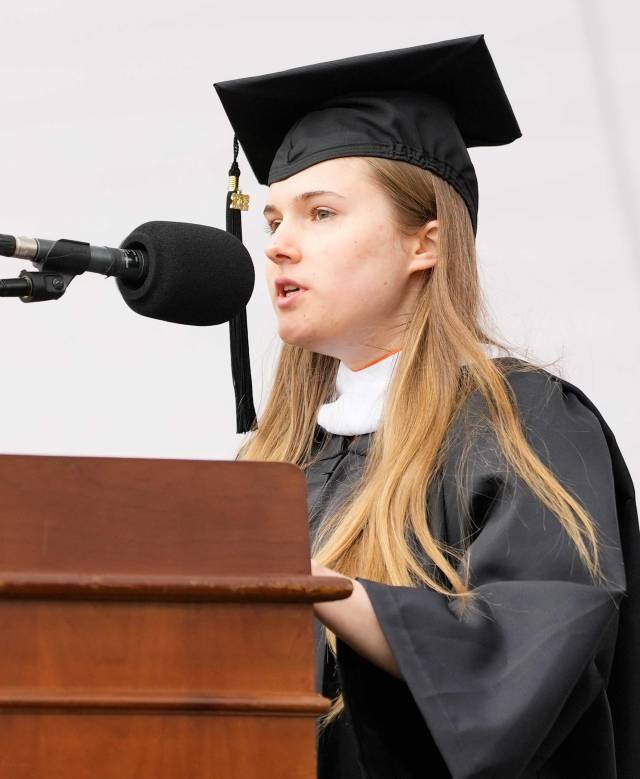
Salutatorian Frances Mangina, a philosophy concentrator from Toronto, addresses her classmates. The Princeton salutatory address is traditionally delivered in Latin.
Frances Mangina, a philosophy concentrator from Toronto, delivered the Latin salutatory address as a poetic ode to the Class of 2022’s Princeton experience.
“Now it is fitting to crown our scholarly heads with green ivy or with orange flowers. Now it is fitting to seize the day with our friends. Companions, let us therefore rejoice in sweet recollection, present joys, and the mystery of things to come,” according to the English translation of Mangina's address. “Let us gather together in one place, dearest comrades, still distanced by the cruel virus, but no longer isolated. Let us sing together of deeds performed in the shadow of ivy-covered towers, so that they may echo in these ancient halls for this year and many more.”
The Commencement ceremony also featured the awarding of honorary degrees to five distinguished guests: Fred David Gray, senior partner in the Tuskegee, Alabama-based law firm of Gray, Langford, Sapp, McGowan, Gray, Gray & Nathanson; Amy Gutmann, U.S. Ambassador to the Federal Republic of Germany and former president of the University of Pennsylvania; Brent Henry, a Princeton Class of 1969 graduate, former University Trustee, and member of the law firm Mintz, Levin, Cohn, Ferris, Glovsky and Popeo P.C.; Eve Marder, the Victor and Gwendolyn Beinfeld University Professor of Biology at Brandeis University; and Frederick W. Smith, founder, chairman and CEO of FedEx Corporation. Gray received a standing ovation from the audience after the reading of his citation, which noted his work on landmark civil rights cases involving Rosa Parks and Claudette Colvin, study participants involved in the infamous Tuskegee Syphilis Study, and the integration of schools in Alabama.
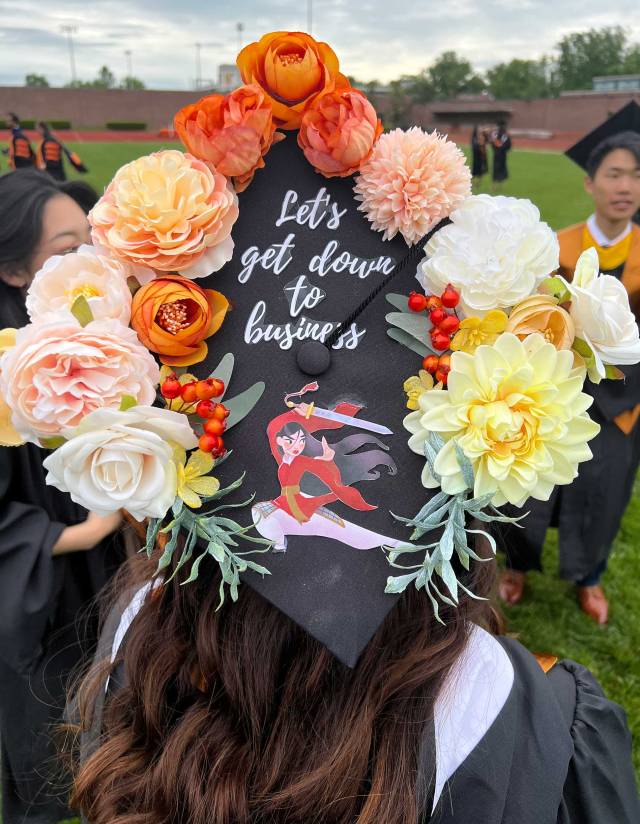
A Princeton graduate's mortarboard was adorned with flowers and the words “Let’s get down to business.”
The Secondary School Teaching Prizes were given to outstanding teachers from secondary schools in New Jersey. Princeton faculty with sustained records of excellence in undergraduate and graduate teaching were honored with the President’s Awards for Distinguished Teaching.
After the ceremony concluded, students — along with their proud family and friends — made their way from the stadium to FitzRandolph Gate at the front of campus. It is a Princeton tradition for undergraduates to walk out the center gate only after they’ve graduated.
For a few students who earned undergraduate degrees in 2020 and master’s degrees in 2022, Tuesday marked their second Commencement in less than a week. The University hosted an on-campus ceremony for the Class of 2020 on May 18, as their original graduation had been held virtually.
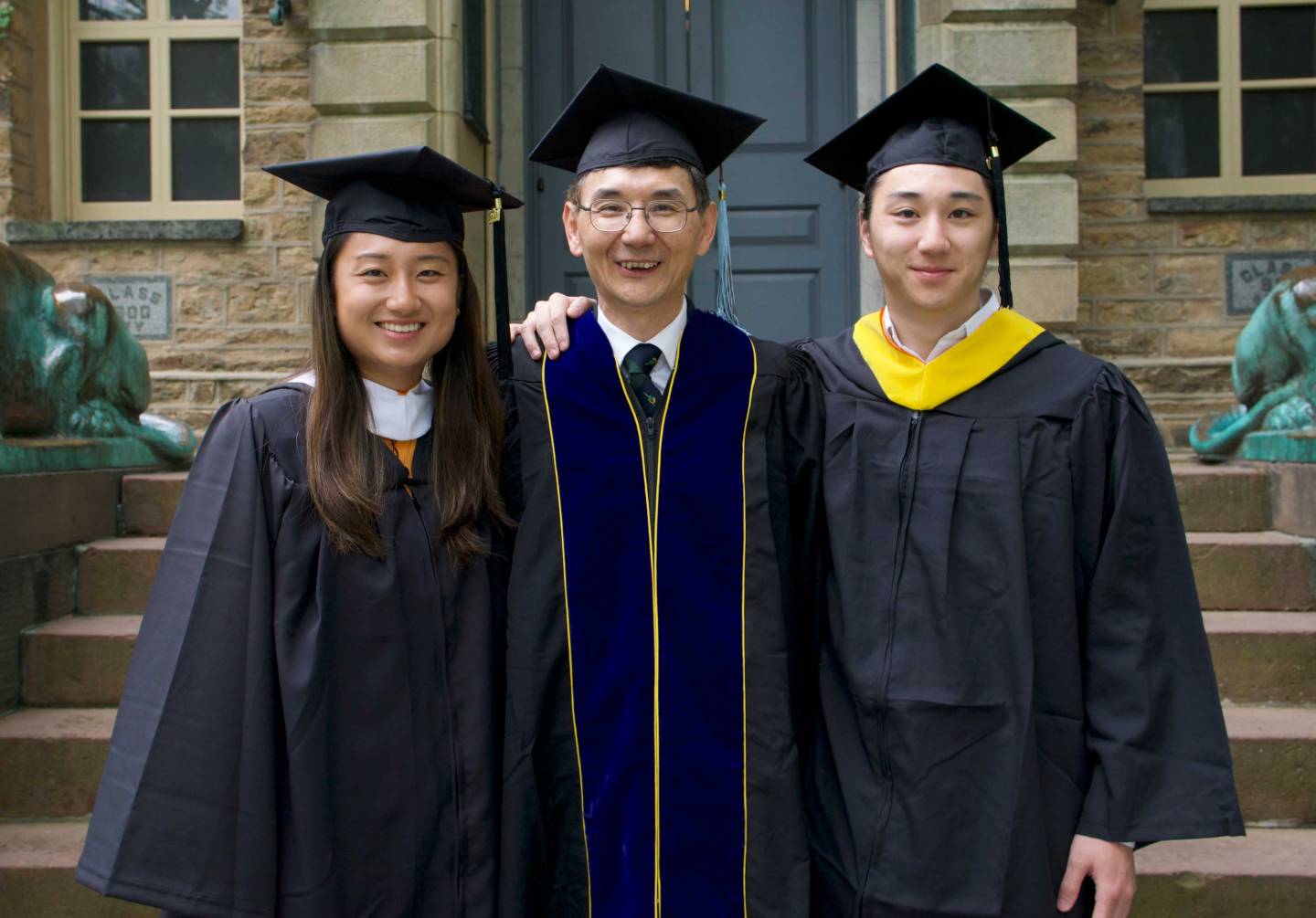
Yiguang Ju (center), the Robert Porter Patterson Professor of Mechanical and Aerospace Engineering, is doubly proud celebrating his children, Class of 2022 graduate Caren Ju (left) and Class of 2020 graduate (right) Alex Ju.
“Graduating back-to-back with two Commencement ceremonies alongside the first in-person Reunions in three years has been beyond incredible — a set of memories to be forever treasured,” said Rawlison Zhang, a 2020 chemical engineering concentrator who earned his master’s in engineering this year. Zhang celebrated his double milestone with family who traveled from Maryland, upstate New York, and Hoboken, New Jersey.
He added: “While Commencement is undoubtedly a beautiful time to commemorate our academic accomplishments, these ceremonies provide us a specially curated time and space to actively reflect and joyously celebrate the community of people who have changed us for good.”
Other year-end events for the Class of 2022 were held May 22 and 23, including the Baccalaureate ceremony, Class Day celebration and Hooding ceremony for advanced degree recipients. An ROTC Commissioning ceremony for students in Army, Navy and Air Force ROTC took place this afternoon.
Visit Princeton’s YouTube channel to re-watch graduation events, and follow #Princeton22 on Facebook, Twitter and Instagram for more highlights, photos and videos.
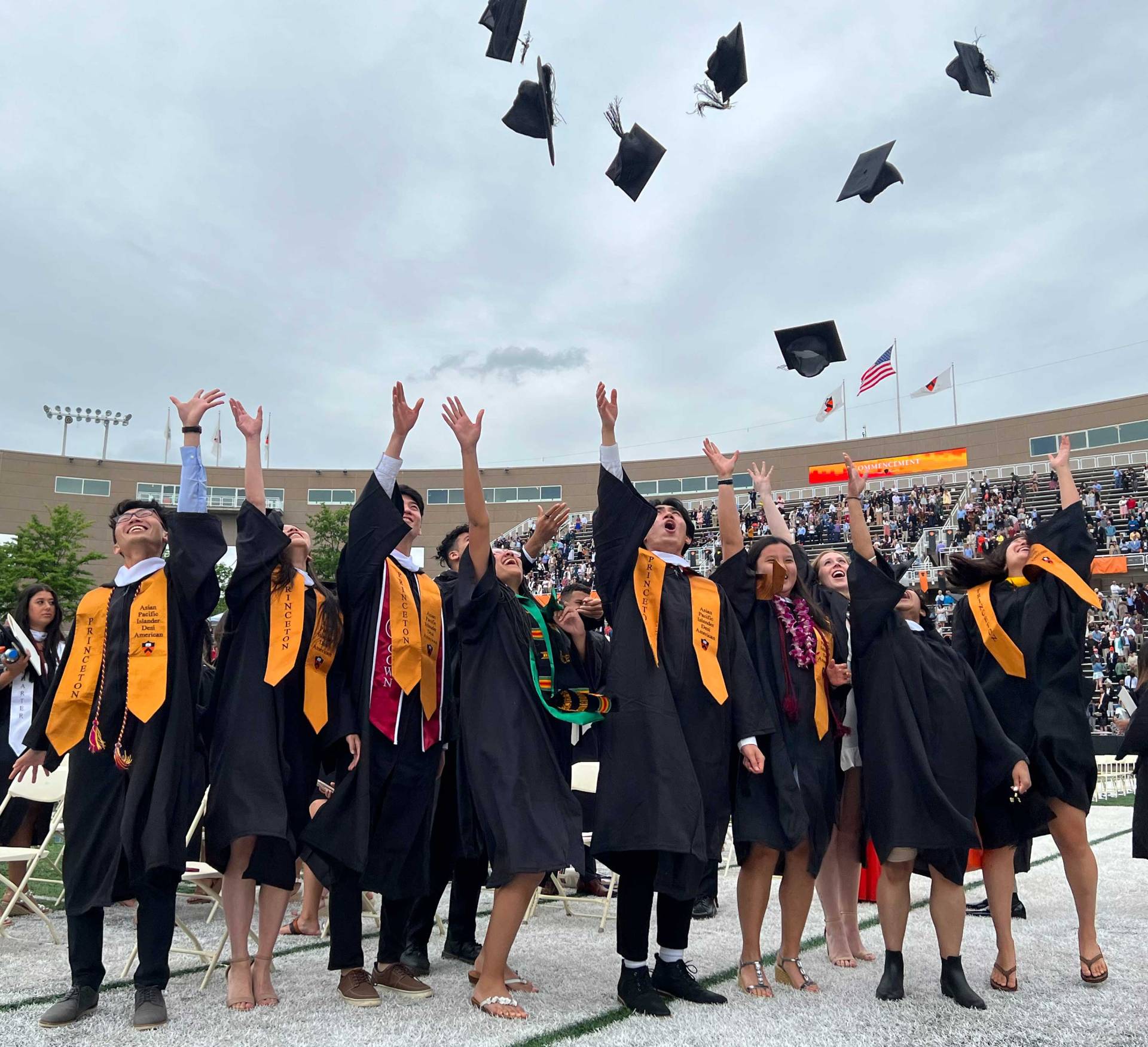
The Princeton Class of 2022 caps off three days of graduation events, including a Baccalaureate service, a Class Day celebration and a Commencement ceremony.














